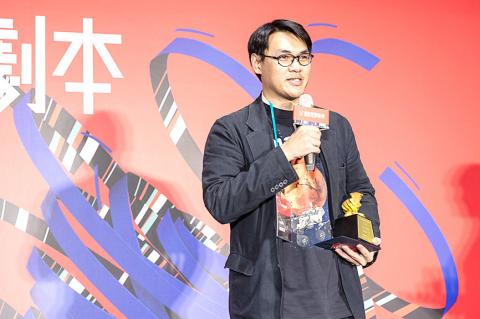Screenwriter Lai Tung-che (賴東澤) on Monday took home the top prize for unproduced scripts at the annual Excellent Screenplay Awards held by the Bureau of Audiovisual and Music Industry Development in Taipei.
His winning script, titled Den Ensamstaende (紅星孤旅), is a sci-fi thriller about an astronaut’s run-in with intelligent machines on Mars.
Writing a script is like creating a small universe, said Lai at the Taipei New Horizon building, where he accepted the award along with a NT$600,000 (US$19,450) cash prize.

Photo: CNA
Lai — who posts his works on the creative writing platform Mirror Fiction (鏡文學) under the pen name Rocke Ryan L”s — said he hoped that the universes he has created would entertain audiences in the future.
Novelist Chang Yao-sheng (張耀升), also of Mirror Fiction, won one of 13 third-place prizes — which came with a NT$100,000 check — for Tui (腿), a dark comedy.
Other third-prize winners included directors Ko Chen-nien (柯貞年) and An Bon (安邦), actress Patty Wu (吳可熙) and actor Soda Voyu (蘇達).
Wu won the award for Nina Wu (灼人秘密), a thriller she wrote with director Chao Te-yin (趙德胤), better known as Midi Z, between acting gigs.
Nina Wu, which is in post-production, was inspired by her experiences in the entertainment business, Wu said.
Shan Hsia Wu Min (山下無名), Voyu’s first script, is about a man who discovers his Aboriginal grandmother’s past.
Voyu — who submitted a script for last year’s contest, but was not selected — encouraged writers not to give up.
In her acceptance speech, second-time winner Hui Wu (繪武), who took home a second-place prize for Tao Chai Nu Wang (討債女王), said that the bureau should provide prize money to nominees as an incentive.
It is difficult for screenwriters to earn a living in Taiwan, she said, adding that they often do not receive fair pay for their work.
The NT$100,000 cash prize that she received last year for Ai Te Cha Chi Fan (愛的詐欺犯) covered her living expenses for four months, she added.
The bureau said that it would consider her advice.
The bureau received 335 submissions this year, 38 of which were nominated. The winners were chosen through a blind selection process to receive NT$4 million in prize money.

The manufacture of the remaining 28 M1A2T Abrams tanks Taiwan purchased from the US has recently been completed, and they are expected to be delivered within the next one to two months, a source said yesterday. The Ministry of National Defense is arranging cargo ships to transport the tanks to Taiwan as soon as possible, said the source, who is familiar with the matter. The estimated arrival time ranges from late this month to early next month, the source said. The 28 Abrams tanks make up the third and final batch of a total of 108 tanks, valued at about NT$40.5 billion

Two Taiwanese prosecutors were questioned by Chinese security personnel at their hotel during a trip to China’s Henan Province this month, the Mainland Affairs Council (MAC) said yesterday. The officers had personal information on the prosecutors, including “when they were assigned to their posts, their work locations and job titles,” MAC Deputy Minister and spokesman Liang Wen-chieh (梁文傑) said. On top of asking about their agencies and positions, the officers also questioned the prosecutors about the Cross-Strait Joint Crime-Fighting and Judicial Mutual Assistance Agreement, a pact that serves as the framework for Taiwan-China cooperation on combating crime and providing judicial assistance, Liang

A group from the Taiwanese Designers in Australia association yesterday represented Taiwan at the Midsumma Pride March in Melbourne. The march, held in the St. Kilda suburb, is the city’s largest LGBTQIA+ parade and the flagship event of the annual Midsumma Festival. It attracted more than 45,000 spectators who supported the 400 groups and 10,000 marchers that participated this year, the association said. Taiwanese Designers said they organized a team to march for Taiwan this year, joining politicians, government agencies, professionals and community organizations in showing support for LGBTQIA+ people and diverse communities. As the first country in Asia to legalize same-sex

MOTIVES QUESTIONED The PLA considers Xi’s policies toward Taiwan to be driven by personal considerations rather than military assessment, the Epoch Times reports Chinese President Xi Jinping’s (習近平) latest purge of the Chinese People’s Liberation Army (PLA) leadership might have been prompted by the military’s opposition to plans of invading Taiwan, the Epoch Times said. The Chinese military opposes waging war against Taiwan by a large consensus, putting it at odds with Xi’s vision, the Falun Gong-affiliated daily said in a report on Thursday, citing anonymous sources with insight into the PLA’s inner workings. The opposition is not the opinion of a few generals, but a widely shared view among the PLA cadre, the Epoch Times cited them as saying. “Chinese forces know full well that